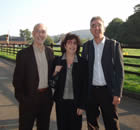 I recently drew up a list of topics I wanted to cover in my Revisiting Old Memories series in the future, and then selected a topic using a random number generator. Here is the blog post on that topic, which is based in part on a post I wrote for my ‘the prof speaks out’ Google blogspot on 5 October 2008. [I’ve made some slight revisions to the original post].
I recently drew up a list of topics I wanted to cover in my Revisiting Old Memories series in the future, and then selected a topic using a random number generator. Here is the blog post on that topic, which is based in part on a post I wrote for my ‘the prof speaks out’ Google blogspot on 5 October 2008. [I’ve made some slight revisions to the original post].
In mid-September 2008, I gave a talk on recovery at a ‘Who Cares?’ Carers’s conference in Gloucester. I had been invited to the conference by Andrea Wilson, and Ian and Irene MacDonald, and was given a 90-minute slot. My current partner Linda had come over from Australia to visit me in Wales, and she attended the conference as well.
Ian MacDonald had first contacted me about five years earlier and we had met several times over the years. He and Irene had lost their son Robin to a heroin overdose, and since then they had set up Carer and Parent Support Gloucestershire (CPSG), which provided one-to-one support sessions. You can read Ian and Irene’s Recovery Story here and a blog post about my visit to see them last year here.

 Continuing the qualitative research project conducted by Gemma Salter, a talented undergraduate student working with me back in 2004. The research involved interviewing nine parents and one grandparent (who had assumed the role of parent) of people with a drug and/or alcohol problem. The participants were recruited from West Glamorgan Council on Alcohol and Drug Abuse (WGCADA) in Swansea and Drug and Alcohol Family Support (DAFS) in Blaenau Gwent, South Wales.
Continuing the qualitative research project conducted by Gemma Salter, a talented undergraduate student working with me back in 2004. The research involved interviewing nine parents and one grandparent (who had assumed the role of parent) of people with a drug and/or alcohol problem. The participants were recruited from West Glamorgan Council on Alcohol and Drug Abuse (WGCADA) in Swansea and Drug and Alcohol Family Support (DAFS) in Blaenau Gwent, South Wales. I met Mike Blanche in around 2003 and he was the first person to help me understand the impact of a person’s substance use problem on family members. Mike was an inspiring figure who had played a key role in the setting up of
I met Mike Blanche in around 2003 and he was the first person to help me understand the impact of a person’s substance use problem on family members. Mike was an inspiring figure who had played a key role in the setting up of  Two of my favourite people that I have met on my Wired In journey are Ian and Irene MacDonald. I first met Ian in 2007 at a Federation of Drug & Alcohol Professionals (FDAP) meeting, although we had been corresponding earlier. Ian and Irene had lost their son Robin to a heroin overdose in 1997 and were now running a family support group, CPSG (Carer and Parent Support Gloucestershire).
Two of my favourite people that I have met on my Wired In journey are Ian and Irene MacDonald. I first met Ian in 2007 at a Federation of Drug & Alcohol Professionals (FDAP) meeting, although we had been corresponding earlier. Ian and Irene had lost their son Robin to a heroin overdose in 1997 and were now running a family support group, CPSG (Carer and Parent Support Gloucestershire).

